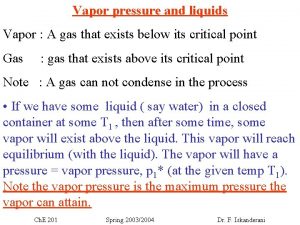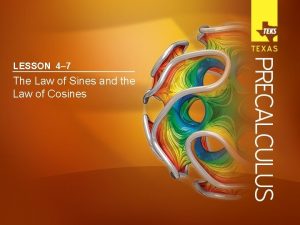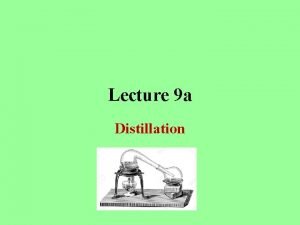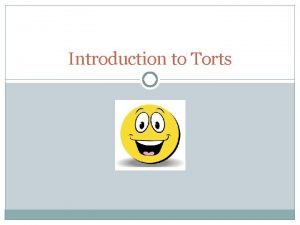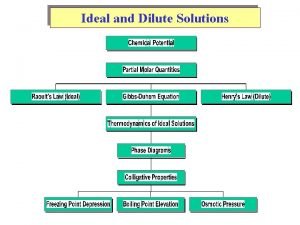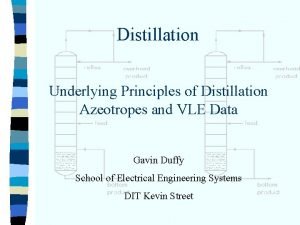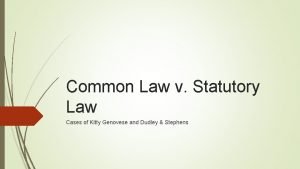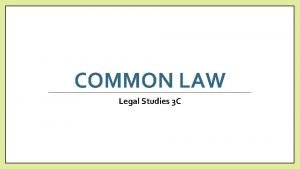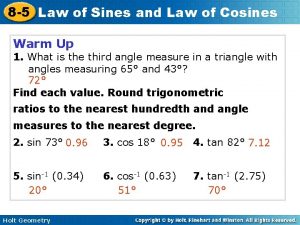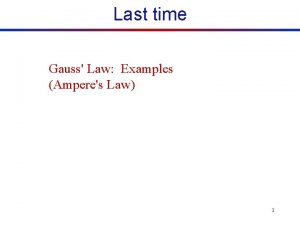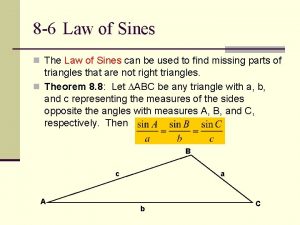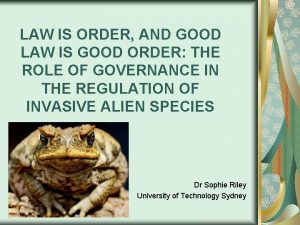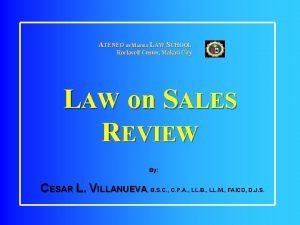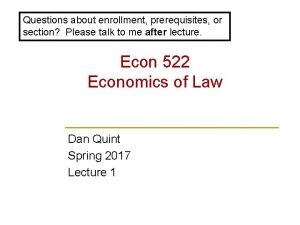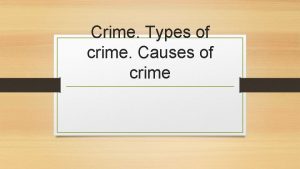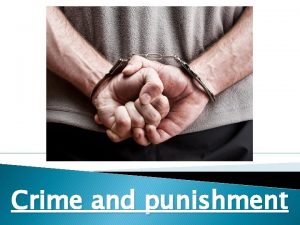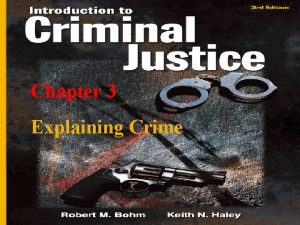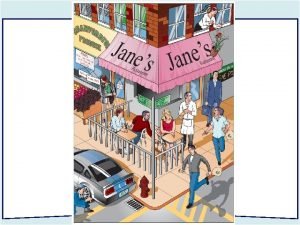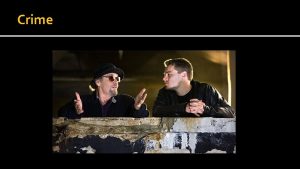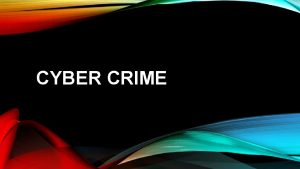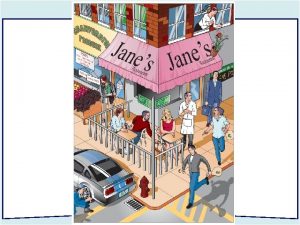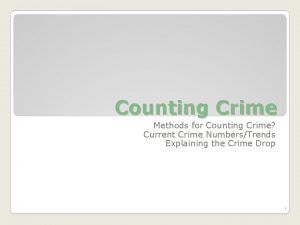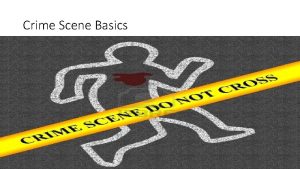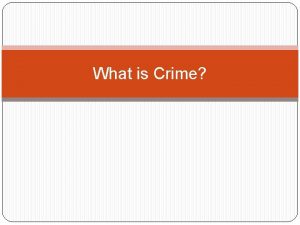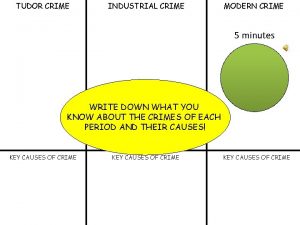Ecommerce Law Crime and ecommerce Crime and ecommerce
















![What is deception? This has been extended in Metropolitan Police Commissioner v Charles [1977] What is deception? This has been extended in Metropolitan Police Commissioner v Charles [1977]](https://slidetodoc.com/presentation_image_h2/6a9b66b852fddc5841b2c67bf00ff524/image-17.jpg)



- Slides: 20

E-commerce Law Crime and e-commerce

Crime and e-commerce There are various ways that crime and e -commerce overlap. Some are peculiar to e-commerce – fraud, others are relevant to computer crime as a whole. This lecture will look at all of these

Spoofing is a term used to describe a person who via electronic means appears to be another person. Recently a person called Abraham Abdallah attracted media attention.

Spoofing Abraham via electronic means impersonated numerous American personalities. These included Paul Allen, the Chief Executive of Microsoft Stephen Spielberg George Lucas; and Oprah Winfrey

Spoofing In the real world, this would be incredibly difficult. By virtual means this is somewhat easier. Abraham hacked into banks and credit card companies and stole personal information that helped him to deceive others.

Spoofing Here numerous offences have been committed. Most notably, hacking and obtaining goods and services by deception.

Hacking means gaining unauthorised entry to a computer system. Most hackers are harmless and merely enjoy the battle for access to secure systems. Sometimes hackers are malevolent and destroy or alter vital data - Rymer

Hacking The offence of hacking is covered by the Computer Misuse Act 1990. Section 1 of the Act deals with simple hacking. It is interesting to note that it is society that has created the phrase not law. The term hacking does not appear within the Act.

Hacking (1) A person is guilty of an offence if-(a) he causes a computer to perform any function with intent to secure access to any program or data held in any computer; (b) and (c) he knows at the time when he causes the computer to perform the function that is the case.

Hacking An offence under section 1 of the Computer Misuse Act carries a sentence of 6 months and a fine of up to £ 5, 000.

Hacking Section 2 of the Act adds to the basic offence of hacking. It deals with hacking with the view to committing any other criminal offence, e. g. theft, or obtaining goods by deception.

Hacking Section 3 of the Act adds to the basic offence of hacking and makes it an offence to alter the information contained in a computer. This is possibly the most serious sort of hacking – Rymer. This section also applies to the transmission of computer viruses.

Fraud Where e-commerce is concerned, many offences will come under the main heading of fraud. The most common would be credit card fraud, where a person uses another persons card details to purchase either goods or services. These are deception offences.

Deception Once a hacker has gained access to a computer s/he may wish to use the computer or the information therein to deceive. Where this occurs, the Theft Acts are relevant.

Theft Act Obtaining Goods by Deception - s 15 Theft Act 1968 Obtaining a money transfer by deception – s 15 A Theft Act 1968. Obtaining Services by Deception – s 1 Theft Act 1978

What is Deception? To deceive is. . . to induce a man to believe that a thing is true which is false. Buckley J in Re London and Globe Finance Corporation Ltd [1903] 1 Ch 728 at p. 732:
![What is deception This has been extended in Metropolitan Police Commissioner v Charles 1977 What is deception? This has been extended in Metropolitan Police Commissioner v Charles [1977]](https://slidetodoc.com/presentation_image_h2/6a9b66b852fddc5841b2c67bf00ff524/image-17.jpg)
What is deception? This has been extended in Metropolitan Police Commissioner v Charles [1977] AC 177 and Lambie [1982] AC 449, to “falsely to persuade someone that something only may be true”

How often does this occur? More often than is advertised. Playboy and Ingrelock 1524 Often individuals do not use the internet because of a fear of fraud.

The Future Will there always be crime? Yes Will there always be fraud? Yes

The Future Will things get better? Yes Consumers are being better protected through legislation. Fraud is getting harder to perpetrate, with the increasing use of electronic signatures and chip and pin cards.
 Newton's first law and second law and third law
Newton's first law and second law and third law Newton's first law of motion
Newton's first law of motion Boyle's law charles law avogadro's law
Boyle's law charles law avogadro's law Constant of avogadro's law
Constant of avogadro's law Raoult's law and dalton's law
Raoult's law and dalton's law Difference between civil law and criminal law
Difference between civil law and criminal law 4-7 the law of sines and the law of cosines answers
4-7 the law of sines and the law of cosines answers Introduction of distillation
Introduction of distillation Difference between civil law and criminal law
Difference between civil law and criminal law Thermodynamics equations
Thermodynamics equations Ethanol distillation temperature
Ethanol distillation temperature Difference between common law and statute law
Difference between common law and statute law Difference between common law and statute law
Difference between common law and statute law Law of sines and cosines quiz part 1
Law of sines and cosines quiz part 1 The vapor pressure of pure water at 110 c is 1070 torr
The vapor pressure of pure water at 110 c is 1070 torr Ampere's law examples
Ampere's law examples 8-6 law of sines
8-6 law of sines Law is order and good law is good order
Law is order and good law is good order Pactum commissorium meaning philippine law
Pactum commissorium meaning philippine law Common law and civil law
Common law and civil law Examples of civil law
Examples of civil law




